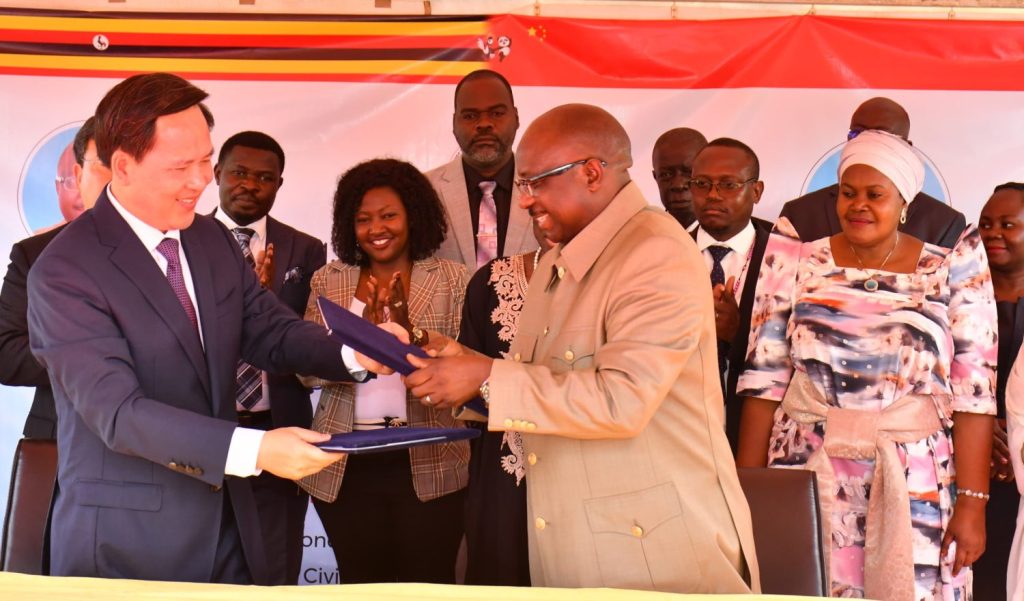A new era of partnership has dawned between the Busoga Consortium for Development (BCD) and Shandong Province of the People’s Republic of China following the signing of a Letter of Intent for Cooperation at the Civil Service College, Jinja, on Monday.
The ceremony was presided over by Rt. Hon. Rebecca Alitwala Kadaga, First Deputy Prime Minister and Minister for East African Community Affairs, who served as Chief Guest.
Also present were Rt. Hon. Rukia Isanga Nakadama, Third Deputy Prime Minister, Bishop Frank Tibagendeka, Governor of the Busoga Consortium for Development, Dr. Anthony Mula, Director General of BCD, Members of Parliament, district heads, religious leaders, government officials, school representatives, and members of the general public who turned up in large numbers to witness the historic occasion.
A MILESTONE IN TRANSFORMATION
In his remarks, Dr. Anthony Mula, the Director General of BCD, described the partnership as “a major milestone in Busoga’s transformation journey.”
“This cooperation is built on trust, shared vision, and the spirit of progress,” he said. “Busoga stands ready to work with Shandong to unlock opportunities in agriculture, industrial growth, and education for our people.”
He explained that the partnership will strengthen Busoga’s ongoing programmes under the Busoga Development Agenda (BDA) and the Village Agricultural Model (VAM)—initiatives designed to localize Uganda’s national development plan at the grassroots.
TIBAGENDEKA: A PARTNERSHIP FOR THE PEOPLE
Bishop Frank Tibagendeka, Governor of BCD, hailed the new relationship as a model of people-centered development and mutual trust.
“Busoga and Shandong share the same values of hard work, innovation, and community building,” he said. “We are proud to pioneer a partnership that brings real solutions to our people.”
He later presented a copy of the Busoga Development Agenda to Vice Governor Wen Nuan, symbolizing the region’s full commitment to long-term collaboration and shared prosperity.
KADAGA: BUSOGA OPEN FOR BUSINESS
Delivering her remarks, Rt. Hon. Rebecca Kadaga congratulated the Consortium for initiating the engagement and thanked the Shandong delegation for choosing Busoga as a partner in progress.
“This cooperation is a clear signal that Busoga is open for business,” she said. “Our people are ready to benefit through technology, agricultural value addition, and education exchange.”
Kadaga commended BCD’s leadership for mobilizing communities around the BDA and called on local leaders to support its implementation for inclusive growth.
NAKADAMA: PROMISING PARTNERSHIPS WITH CHINA
In her submission, Rt. Hon. Rukia Isanga Nakadama, Third Deputy Prime Minister, noted that Busoga’s engagements with various Chinese provinces continue to yield promise.
“Busoga has entered into a number of promising cooperation agreements with Chinese provinces, each carrying the potential to change lives through investment, trade, and knowledge exchange,” she said.
Nakadama added that such partnerships demonstrate growing international confidence in Busoga’s development direction under the Consortium’s leadership.
SUPPORT FOR EDUCATION AND GREEN INDUSTRY
As part of the visit, Vice Governor Wen Nuan extended support to education in Busoga by donating school bags, scholastic materials, and soccer balls to local schools—an initiative warmly received by learners and teachers.
Later, the delegation jointly launched the AFRiGO Bamboo Project, a partnership between Busoga and Shandong aimed at producing and adding value to bamboo wood for furniture, construction, and other eco-friendly products.
The project is expected to promote green industrialization, job creation, and environmental conservation, serving as a vivid example of sustainable cooperation.
“The AFRiGO Bamboo initiative will make Busoga a center of green growth and eco-friendly industry,” said Dr. Mula. “It represents the next phase of our partnership with Shandong.”
A FUTURE OF SHARED PROSPERITY
The Busoga–Shandong cooperation is expected to open new opportunities in trade, agriculture, investment, education, and green development, driving the region’s march toward shared prosperity.


